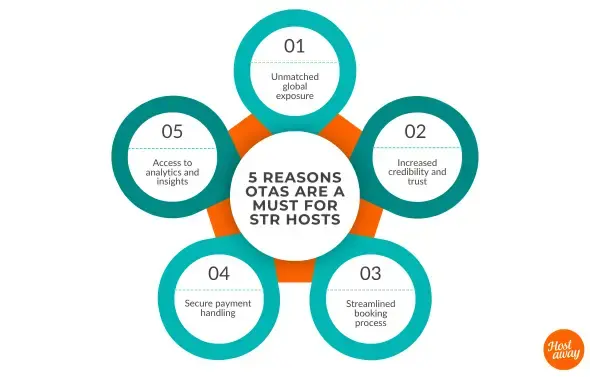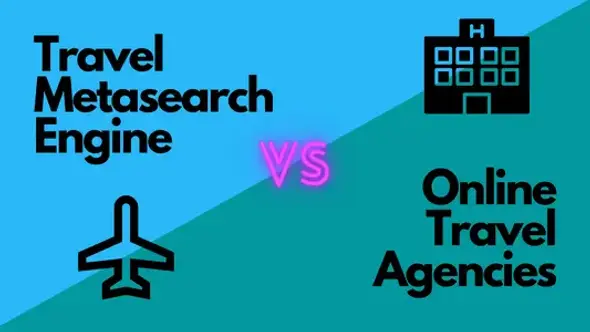What is an OTA? Online Travel Agency Defined

Getting consistent bookings for your short-term rental isn’t as simple as just listing your property and waiting for guests to roll in. With millions of vacation rentals and hotels out there, standing out takes strategy and that’s where the right booking platform can make all the difference.
In this blog, we’ll dive into what is an OTA, how they work and most importantly how to use them to your advantage. If you’re looking to increase your bookings, reach more guests and streamline your booking process — this one’s for you.
What is an OTA (Online Travel Agency)?
OTA stands for Online Travel Agency. These digital platforms — like Airbnb, Vrbo and Booking.com — act as intermediaries between hosts like you and travelers looking for accommodation.
Think of them as online marketplaces or booking platforms that connect your vacation rental property with a global, local or niche audience of potential guests.
Why OTAs Matter for Short-Term Rental Hosts
OTAs have changed the way the travel industry works, making it easier for property owners to connect with travelers and secure more bookings. Here’s why they’re so valuable:

1. Unmatched global exposure
Listing your property on a booking platform gives it global visibility. Millions of travelers use these platforms to search for accommodations every day, which means your listing has the potential to reach a massive audience.
This increased visibility improves your ability to secure bookings, even during slower seasons or in areas with limited travel options.
2. Increased credibility and trust
Travelers are more likely to book through platforms they know and trust. Being listed on a reputable booking site adds credibility to your property and makes guests feel more comfortable about booking.
These platforms often have secure payment systems and guest protection policies, which give travelers peace of mind.
3. Streamlined booking process
OTAs make it easy for guests to find and book your property. Travelers can search based on location, amenities and price, then book their trip directly through the platform in just a few clicks.
The simplified process benefits both you and your guests, increasing the chances of securing a reservation.
4. Secure payment handling
Handling payments can be risky, but booking platforms take care of that for you. Most of these platforms process payments on your behalf and transfer the funds to you after the guest checks in.
This reduces the risk of fraud and ensures you receive your funds on time. It also reassures guests that their payment is protected.
5. Access to analytics and insights
OTAs provide hosts with valuable data and performance insights. You can track booking trends, guest behavior and how your listing compares to similar properties. This helps you adjust your pricing, improve your listing and identify opportunities to increase bookings.
Many platforms also offer dynamic pricing tools to help you stay competitive and maintain steady revenue.
How OTAs Make Money in the Short-Term Rental Market
OTAs use different business models to generate revenue. Understanding how they work can help you choose the right platform and manage your costs effectively.
Commission model
The commission model is the most common approach. In this setup, hosts list their property for free but pay a percentage of each successful booking to the OTA. This gives OTAs an incentive to promote your listing since their earnings are tied directly to your bookings.
Many platforms that use this model, like Airbnb, Vrbo, Booking.com and Expedia, also charge a commission from guests, increasing their overall revenue.
Subscription model
In this model, hosts pay a fixed fee to list their property on the platform, regardless of how many bookings they get. This setup allows you to predict your costs more easily, but you’ll need to factor in how many bookings you expect to make.
Platforms like Furnished Finder use this model. Some platforms using the subscription model may also charge guests a booking fee, while others keep it free for travelers.
Hybrid model
Some OTAs combine elements of both the traditional commission and subscription models. This means you might pay a lower commission rate if you also pay a subscription fee or vice versa.
This setup gives hosts more flexibility in managing costs and adjusting their strategy based on demand.
Other
A few OTAs have their own unique way of making money. For example, some platforms don’t charge hosts or guests directly but instead add a markup to the rate provided by the host.
Got2Go, for instance, doesn’t charge hosts but instead makes money through a service fee that guests pay per booking or through an annual subscription.
How to Maximize Your OTA Strategy in Short-Term Rentals

To get the most benefit out of OTAs, start by optimizing your listings.
High-quality photos, detailed descriptions and competitive pricing help boost visibility and attract more bookings. Quick responses to guest inquiries and positive reviews can bolster your property's reputation and search rankings, leading to higher conversion.
Each platform has its own set of requirements, so tailor your listings accordingly. And don’t forget to highlight what makes your destination unique — whether it’s breathtaking scenery, local attractions or a one-of-a-kind experience — to draw in travelers looking for something special.
OTAs vs Metasearch Engines

Source: MyTravaly
OTAs and metasearch engines may seem similar, but they serve different purposes in the travel industry.
OTAs, as mentioned earlier, are platforms where hosts list their properties and travelers can directly book accommodations. These platforms facilitate the entire booking process, including payment transactions and communication between hosts and guests.
Metasearch engines, like Google Travel and TripAdvisor, aggregate information from various OTAs and other sources, allowing travelers to compare prices and availability across different platforms. Metasearch engines redirect users to the respective OTA listings or direct booking websites to complete their reservations.
While both OTAs and metasearch engines contribute to a property's online visibility, OTAs offer a platform for booking directly while metasearch engines redirect to an OTA or direct booking listing.
Maximize Your Success with OTAs
OTAs have made it easier than ever for short-term rental hosts to reach a wider audience and increase bookings. (It's even easier when you have a leading vacation rental channel manager in your toolkit.)
They handle the booking process, payments and guest communication, giving you more time to focus on creating a great guest experience. While the fees can add up, the increased visibility and trust that come with being listed on a reputable platform often make it a worthwhile investment.
To maximize your success with OTAs, you need to be strategic. Understanding how each platform works — from commission rates to search rankings — allows you to adjust your pricing and improve your listing’s performance.
Listing on multiple OTAs expands your reach and using tools like dynamic pricing and automated messaging helps you stay competitive. The key is finding the right balance between OTAs and direct bookings to keep your calendar full and your business thriving.